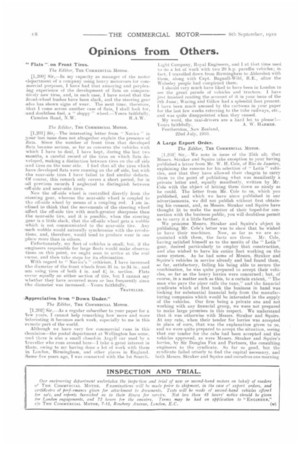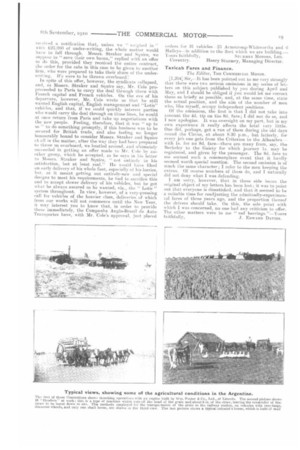Opinions from Others.
Page 20

Page 21

If you've noticed an error in this article please click here to report it so we can fix it.
"Flats ":on Front Tires.
The Editor, THE COMMERCIAL MOTOR.
11,2001 Sir,—In my capacity as manager of the Ill0t011Ilepartment of a company using heavy motorcars for commercial purposes, I have had that annoying and perplexing experience of the development of fiats on comparatively new tires, and, in each ease, I have noted that the .front-wheel bushes have been slack, and the steering gear .also has shown signs of wear. The next time, therefore, that I come across another case of flats, I shall took for, .and doubtless find, a " sloppy " wheel —Yours faithfully,
Camden Road, N.W. R.A.W.
The Editor, THE COMMERCIAL MOTOR.
[1,201] Sir,—The interesting letter from " Novice " in your last issue does not altogether explain the presence of fiats. Since the number of front tires that developed :flats became serious, so far as concerns the vehicles svith -whieh I have to deal, I have kept, during the last two months, a careful record of the tires on which flats developed, making a distinction between tires on the off side and tires on the near side. I find that. all the tires which lave developed flats were running on the off side, but with the near-side tires I have failed to find similar defects. Of course, this remark only covers a short period, for in sall previous records I neglected to distinguish between off-side and near-side tires.
Now the off-side wheel is controlled directly front the ssteering gear, whereas the near-side wheel is coupled to -the off-side wheel by means of a coupling rod. I am in-.dined to think that the movements of the steering wheel -affect the off-side tire with much-greater sharpness than the near-side tire, and it is possible, when the steering :gear is a little slack, that the off-side wheel gets a wobble which is not communicated to the near-side tire. Any ssuch wobble would naturally synchronize with the revolutions, and, therefore, would tend to produce wear in one -place more than in others.
Unfortunately, my fleet of vehicles is small, but, if the 6engineers responsible for large fleets would make observations on this point, we ought soon to arrive at the real w.mme, and then take steps for its elimination. With regard to " Novice's " criticism, I have increased t he diameter of the front wheels from 31 in. to 34 in., and aim using tires of both 4 in. and ,t?., in. section. Flats aleeur equally on either section of tire, but I cannot say -whether they have occurred more or less frequently since the diameter was increased.—Yours faithfully,
TRAVELLER.
• Appreciation front "Down Under."
The Editor, THE COMMERCIAL MOTOR.
[1,202] Sir,—As a regular subscriber to your paper for a issw years, I cannot help remarking how more and more 'interesting it becomes each week, especially to me in this --remote part of the world.
Although we have very few commercial vans in this ademinion—the postal department at Wellington has some, :and there is also a small elissed-in Argyll car used by A traveller who runs around here—I take a great interest in them, owing to my having done a lot of work with them in London, Birmingham, and other places in England. Some five years ago, I was connected with the 1st Search Light Company, Royal Engineers, and I at that time used to do a lot of work with two 20 h.p. paraffin vehicles; in fact, 1 travelled down from Birmingham to Aldershot with them, along with Capt. Bagnall-Wikl, R.E,, after the Wolseley people had completed them.
1 should very much have liked to have been in London to see the great parade of vehicle and tractors. I have just finished reading the account of it in your issue of the Uth June; Waring and Gilkey had a splendid fleet present. I have been much amused by the cartoons in your paper for the last few weeks referring to the tube railways, etc., 1.11d was quite disappointed when they ceased.
ikly word, the taxi-drivers are a hard lot to please!— Yours faithfully, A. W. HARMER. Featherston, New Zealand, 22nd July, 1910.
A Large Export Order.
The Editor, THE COMMERCIAL MOTOR.
L1.203] Sir,--We note in issue of the 25th ult. that Messrs. Straker am! Squire take exception to your having published a letter from Mr. W. H. Cole, of Rio de Janeiro, explaining the reasons for his selection of " Lotis " vehicles, and that they have allowed their chagrin to carry them to the point of publishing what was manifestly a private letter and, equally manifestly, written by Mr. Cole with the object of letting them down as nicely as he could. The letter from Mr. Cole to us, which you published, and which we have since published in our advertisements, we did not publish without first obtaining his consent, and, as Messrs. Straker and Squire have thought fit to make the matter of their hoped-for connection with the business public, you will doubtless permit us to carry it a little further.
We presume Messrs. Straker and Squire's object in publishing Mr. Cole's letter was to show that he wished to have their machines. Now, so far as we are acquainted with them, the facts are these. Mr. Cole, haying satisfied himself as to the merits of the " Lotis " gear, desired particularly to employ that construction, and also wished to have his entire fleet working on the same system. As he had some of Messrs. Straker and Squire's vehicles in service already and had found them, so far, satisfactory, failing his being able to secure the combination, he was quite prepared to accept their vehicles, so far as the heavy lorries were concerned; but, of course, in a. matter such as this, to a certain extent, " The man aim pays the piper calls the tune," and the financial syndicate which at first took the business in hand was looking for substantial financial help from the manufacturing companies which would be interested in the supply of the vehicles. Our firm being a private one and not working with any financial group, we were not prepared to make large promises in this respect. We understand that it was otherwise with Messrs. Straker and Squire. At any rate, when their tender for lorries was accepted in place of ours, that was the explanation given to us, and we were quite prepared to accept the situation, seeing that our tender for the cabs had been accepted and the vehicles approved, as were Messrs. Straker and Squire's lorriea, by Sir Douglas Fox and Partners, the consulting engineers to the syndicate. So far so good, but the syndicate failed utterly to find the capital necessary, and both Messrs. Straker and Squire and ourselves one morning received a notification that, unless we " aeiglied in " with £25,000 of under-writing, the whole matter would have to fall through. Messrs. Straker and Squire, we uppose to " save their own bacon," replied with an offer to do this, provided they received the entire contract, the order for the cabs in this case to be given to another firm, who were prepared to take their share of the underwriting. We were to be thrown overboard!
In spite of this offer, however, the syndicate collapsed, and, as Messrs. Straker and Squire say, Mr. Cole proproceeded to Paris to carry the deal through there with French capital and French vehicles. On the eve of his departure, however, Mr. Cole wrote us that he still wanted English capital, English management and "Lotis" vehicles, and that, if we (mold quickly interest parties who would carry the deal through on those lines, he would at once return from Paris and take up negotiations with the new people. Feeling, therefore, that it was " up to
" to do something promptly, if this business was to be secured for British trade, and also feeling no longer honourably bound to consider Messrs. Straker and Squire at all in the matter, after the way they had been prepared to throw us overboard, we hustled around, and ultimately succeeded in getting an offer made to Mr. Cole by another group, which he accepted, as he says in his letter to Messrs. Straker and Squire, " not entirely to his satisfaction, but at least real." He would have liked all early delivery of his whole fleet, especially of his lorries, but. as it meant getting out entirely-new and special designs to meet his requirements, he had to sacrifice this and to accept slower delivery of his vehicles, Ind, he got what he always assured us lie wanted, viz., the " Dais " system throughout. In view, however, of a very-pressing call for vehicles of the heavier class, deliveries of which from our works will not commence until the New Year, it may interest you to know that, in order to provide these immediately, the Companha Anglo-Brazil de Auto Transportes have, with Mr. Cole's approval, just placed orders for 31 vehicles -25 Armstrong-Whitworths and IJ Halleys—in addition to the fleet which we are building.—
lours faithfully, STCRMEY MOTORS, LTD.
Coventry. Henry Sturmey, Managing Director.
Taxicab Fares and Finance.
The Editor, THE COMMERCIAL MOTOR.
[1,204] Sir,--It has been pointed out to me very strongly that there were two serious omissions in my series of letters on this subject published by you during April and May, and I should be obliged if you would let me correct these as briefly as possible, and, at the same time, state the actual position, and the aim of the number of men who, like myself, occupy independent positions.
Of the -omissions, the first is that I did not take into account the 4d. tip on the &I. fare; I did not do so, and I now apologize. it was oversight on my part, but in my own experience it really affects the total very little. One did, perhaps, get a run of them during the old days round the Circus, at about 8.30 p.m., but latterly, for every job one gets from the Criterion to the Alhambra-with is. for an 8d. fare—there are many from, say, the Berkeley to the Gaiety for which journey is. may be registered, and given by the passenger. The &I. fare to me seemed such a commonplace event that it hardly seemed worth special mention. The second omission is of much the same character; I refer to the men keeping the extras. Of course numbers of them do, and I naturally did not deny what I was defending.
I am sorry, however, that in these side issues the original object of my letters has been lost ; it was to point out that everyone is dissatisfied, and that it seemed to be a suitable time for readjusting the admittedly-experimental fares of three years ago, and the proportion thereof the drivers should take. On this, the sole point with which I was concerned, no one had any criticism to offer. The other matters were to me " red herrings."—Yours
faithfully, .T. EDWARD DAVIES.
























